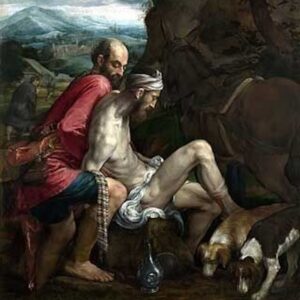Legend, the Google definition states, is a “a traditional story sometimes popularly regarded as historical but unauthenticated.” Brendan, the 1987 historical novel by theologian Frederick Buechner, uses this term to its advantage. St. Brendan of Clonfert (c. AD 484 – c. AD 577), or Brendan the Navigator in Catholic tradition, is the novel’s subject. The story is told by a fellow monk, Finn, while joining the Brendan on a seafaring journey in search of the Isle of the Blessed. The idea of legend as a kind of unverifiable history pulls it out of its common negative connotation, at least for the jaded and skeptical of my own generation. Still, so much of Brendan reads like the acceptance, and even exaggeration, of Brendan’s life and journeys.
Brendan of Clonfert’s life is recorded in few sources. The most prominent, Navigatio Sancti Brendani Abbatis, (Voyage of Saint Brendan the Abbot), is extant in about 100 manuscripts, the earliest dated to c. 900. The Navigatio is part of a genre of Irish narrative called immram. Brendan’s exemplary Navigatio was among the most popular of such stories in the Middle Ages. Immrama are stories of seafaring journeys, some with Christian themes. Buechner has taken the idea of the “traditional story, sometimes popularly regarded as historical but unauthenticated,” and fictionalized it for a contemporary audience.
What Buechner manages to accomplish with his novel is something of a reclamation. It is sometimes difficult for the jaded and skeptical among us, me included, to believe stories called legends because the word connotes, at times, ludicrous fairy tales—things that never happened about people that never existed. The blurred figure of Brendan lies somewhere astride a mystical grail story at sea and the biographical materials of a sixth century abbot of Ireland. Buechner doesn’t force his readership to pick a side. We know Brendan of Clonfert must have existed, as others of the period say he did and describe his life. Whether or not Brendan took to the sea with his companions looking for the Isle of the Blessed is assumed fact. We have only historical context to guide our speculation. What’s best, however, is that an answer is not needed in the world of literature.
I offer here, nevertheless, an example of Buechner’s prose reminiscent of the American “tall tales” I was taught as a child. There are aspects of the “tall tale” of early American lore (think Johnny Appleseed, Paul Bunyan, and Babe the Blue Ox) meant to express a kind of theocultural zeitgeist from a single moment in time. More importantly, these tales were an expression of a specific faith. In one account of Brendan’s childhood told by Finn the narrator, Brendan describes his earliest altruistic act—saving a small boy frozen stiff in the cold:
Such a day for cold you never did see, Finn,” [Brendan] said. “I came on a boy with warts standing in the snow. He was frozen to death nearly by the looks of him. His lips were so stiff he couldn’t get a word out when I asked him why he didn’t come in by the fire with the rest of us. Then I saw the reason plain as day. The cold had had him weeping and his tears had frozen hard clear to the ground. He was tethered there by his two eyes and would have perished surely if I hadn’t broken the silver icy streams of his grief with a stick and freed him. (Brendan, 12)
This single example of Buechner’s theological craft represents him well. Everything pertinent to the suffering human is here: “The cold had had him weeping and his tears had frozen hard clear to the ground. He was tethered there by his two eyes and would have perished surely…” Grief is like being in prison without a determined sentence of time. Though I have never seen someone weep as much as is needed to freeze them to the ground, grief, powerlessness, faithlessness, or at least faith waning—can feel like imprisonment. And where legend and life entwine, sometimes knottily, confusedly so, there tends to be the kind of powerlessness offensive to contemporary American minds.
Grief, indeed, is the only human suffering innately resistant to definition. And sadly, because contemporary American psychiatric rhetoric has forced our soul’s eye ever inward, we cannot accept grief for the baffling pain it is. The worst thing I find can be said to someone suffering loss, indeed tragic loss, aims to try and relieve the sufferer of the present grief. Loss can have no limits on its sadness. Nor can loss require of us a magnitude or duration to bring it to heel. I can say it is as permanent a dismemberment of the soul as losing an arm or a leg. The same phantom feelings an amputee might feel after losing a leg—is the leg still there? —are often the same feelings one learns when mourning the loss of a loved one.
When my brother was killed in a head-on motorcycle accident in June 2015, the following grief felt like a prison. Though I understood God deeply at the time, it was a penetrating derailing of my own faith. I cannot elaborate on how I was freed from it or made freer in the grief. But it was in the intense grief of his loss I was scooped empty, like an avocado spooned out, leaving only rough skin. I managed to thank God for the brother I was given, riding an escalator into the lobby of Fairfax Hospital where my brother died thirty-six hours after the accident. I hate talking about it. But for me, so many of the details of his loss remind me of legend. He died on 21 June 2015, on the summer solstice—the longest day of the year. It was irredeemably hot. It was stifling and long—the light lingering like the coals of campfire. It was the longest day of the year by calendar, and the longest day of the year by my experience of it. The passage I quoted from Brendan reminds me of the true experience of something—an experience of suffering that avoids the need to be labeled “good” or “bad.” Categorization is control, but sometimes a lack of control is a category itself.
I can say that the perichoreses of adventure, legend, and human suffering are tangible, acute, and quite present in Buechner’s prose. Something of the lyric consciousness of the Irish across all ages is present, the narrator Finn’s descriptions and colloquial Irish dialogue chief among them. But lastly, and most importantly, Brendan’s freeing the boy whose tears chained him to the earth speaks to the liberty of the Gospel. I believe Buechner would agree with what Paul writes in his second letter to the Church at Corinth: “Where the Spirit of the Lord is, there is liberty” (2 Cor. 3:17b). Buechner’s materials here reflect the liberation of a gospel meant to create faith in a world of loneliness. It is important for me as a poet and writer to express our freedom to suffer, but most important our literary audacity to hope, pray, and not worry.
Dan Jenkins is a writer and poet living and working in Northern Virginia. He is a graduate of the MFA Program for Writers at Warren Wilson College (Poetry, ’18). His poems and prose have appeared in Poetry Northwest, Cold Mountain Review, Up the Staircase Quarterly, Cagibi, Maryland Literary Review, Hong Kong Review, and others.





